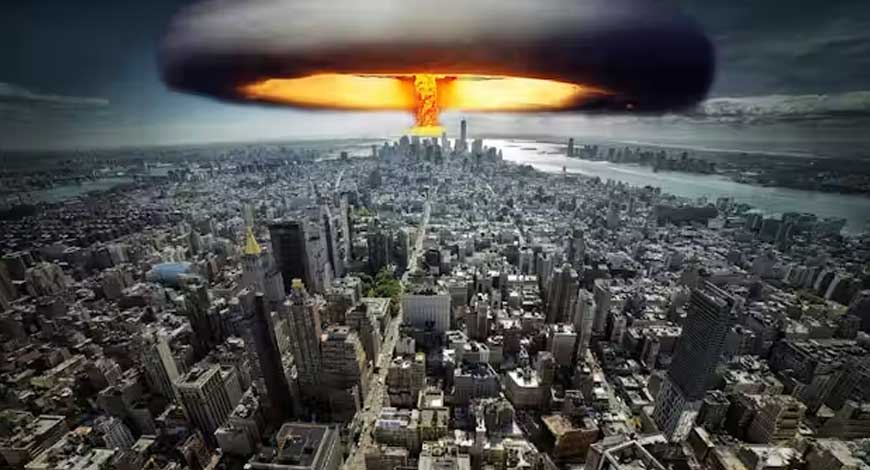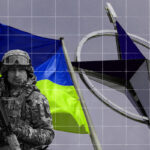By Dr Arun Mitra
In the highly surcharged atmosphere due to ongoing war between Russia & Ukraine and Israeli aggression on Gaza, the fear of use of nuclear weapons looms large. People around the globe had become complacent about the need of the abolition of nuclear weapons. Thus, the Treaty on the Prohibition of Nuclear Weapons (TPNW) did not become people’s issue. This is despite the fact that the treaty was passed by an overwhelming majority of the delegates in the UN General Assembly in 2017 with only one vote against and one abstention. But now as the fear of nuclear threat is increasing, people are getting sensitized about the need for their abolition. People in South Asia after a recent short lived war between India and Pakistan are also feeling the nuclear danger.
Under these circumstances it has become all the more important to inform the people about the damage a nuclear exchange could cause. Studies have warned that a nuclear exchange between India and Pakistan could put over 2 Billion people at risk of starvation and death. More than 5 billion people would die of hunger following a full-scale nuclear war between the U.S. and Russia, according to a global study led by Rutgers climate scientists that estimates post-conflict crop production. “The data tell us one thing: We must prevent a nuclear war from ever happening,” said Alan Robock, a Distinguished Professor of Climate Science in the Department of Environmental Sciences at Rutgers-New Brunswick and co-author of the study. Lili Xia, an assistant research professor in the School of Environmental and Biological Sciences, is lead author of the study published in the journal Nature Food.
An authenticated study by the WHO is much needed to strengthen the earlier studies. The World Health Organization (WHO) had extensively studied the impact of nuclear war on public health, focusing on the devastating consequences on health services and environmental health. It produced multiple reports documenting these impacts, including a report in 1987 titled “Effects of nuclear war on health and health services” and a 1993 report on the health and environmental effects of nuclear weapons. Key findings from WHO studies include: Massive casualties and long-term health effects, environmental degradation including radioactive contamination in addition to psychological & social impacts.
The recent World Health Assembly (WHA), which is the supreme decision-making body of the World Health Organization (WHO) in its meeting held in Geneva from 19th to 27th May 2025, mandated WHO to update 30-Year-Old Review on Health Impacts of Nuclear War – After Heated WHA Debate. The resolution for this was primarily proposed by Marshall Islands, Samoa, and Vanuatu – with major assists from Micronesia and Kazakhstan and ultimately co-sponsored by 34 countries. Out of the 181 eligible voters the resolution was passed with 86 votes in favour, 28 abstentions and 14 against. 53 countries did not participate in the voting. It is unfortunate that USA did not participate in the WHA. Out of 14 no votes 12 were from NATO countries. Out of the nuclear weapons possessing countries UK, France, Russia and North Korea voted against the motion. India, China, Israel and Pakistan were among those who abstained.
Need for the study has also become important because the destructive power of the nuclear weapons has increased manifold since 1945. Knowledge of the humanitarian consequences of use of nuclear weapons can be a warning signal prompting the world to think of complete abolition. If this does not happen, there is a danger that more counties may join the nuclear arms race. It would be naive to believe that the nuclear weapons will remain only with nine countries if not abolished now.
That the nuclear weapons serve as deterrent is being floated by the pro nuclear lobby. They say that if Ukraine had nuclear weapons, Russia would have not attacked it. As per the report by Espreso, a Retired British Army officer Richard Kemp said on May 31, during the Black Sea Security Forum in Odesa that the United Kingdom should help Ukraine develop its own nuclear weapons under a strategic partnership agreement. “Britain has to ensure Ukraine’s Armed Forces once again possess nuclear weapons,” Kemp stated.
It is to great satisfaction that several non-governmental organisations extensively worked for the resolution to be debated in the WHA. The Geneva office of the International Physicians for the Prevention of Nuclear War (IPPNW) played an appreciable role in this. The IPPNW has warned several times from different forums that in the eventuality of a nuclear exchange the medical science has no remedy to offer and all out nuclear exchange between the major powers could be the final pandemic. (IPA Service)

 Britain To Revamp Its Defence And Security To Meet New Challenges In Europe
Britain To Revamp Its Defence And Security To Meet New Challenges In Europe 